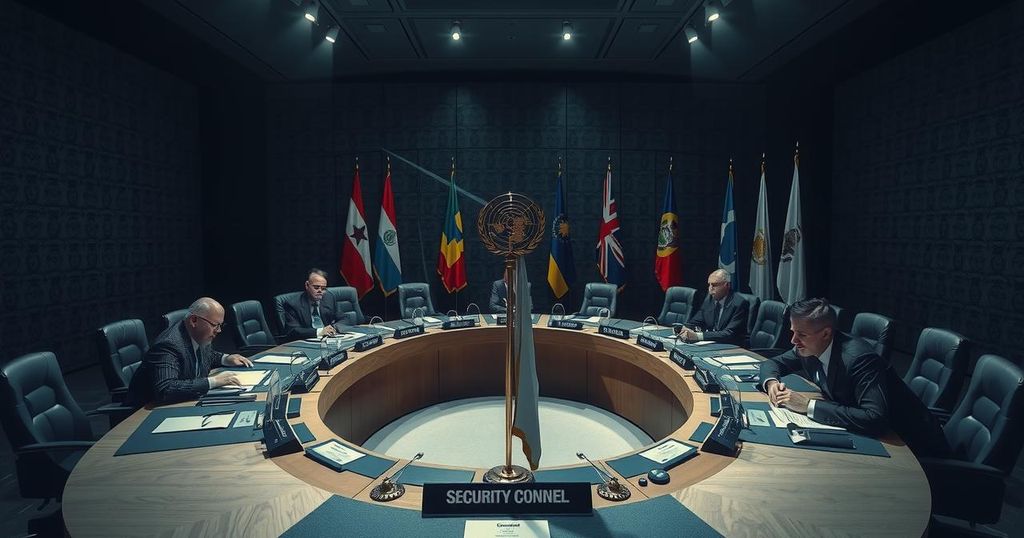Global news
ALI BA, ANTONIO GUTERRES, ASIA, CHINA, CONFLICT, COUNCIL, DOROTHY SHEA, EUROPE, EUROPE/ASIA, FRANCE, GUTERRES, HAMAS, HEZBOLLAH, INTERNATIONAL RELATIONS, IRAN, ISRAEL, MEXICO, MIDDLE EAST, NORTH AMERICA, NUCLEAR POLICY, PAKISTAN, RUSSIA, SANCTIONS, SHEA, TEHRAN, UK, UN, UNITED NATIONS SECURITY COUNCIL, UNITED STATES, UNSC, US, WASHINGTON
Fatima Khan
0 Comments
Key Players Tangle at UNSC at ‘Perilous Turn’ of US-Israel-Iran Conflict
The UNSC convened an emergency meeting in response to US-led military strikes on Iranian nuclear sites, resulting in escalating tensions. Major member states presented a resolution for a ceasefire, while the US and Israel defended the strikes. UN Secretary-General Guterres warned of a dangerous escalation, with multiple ambassadors offering sharp rebukes and calls for restraint.
Tensions are escalating at the United Nations Security Council (UNSC) as member states respond to recent US-led military strikes on Iranian nuclear sites. An emergency session was held following these actions, with Iran and its allies vehemently condemning the attacks while the US and Israel fervently defended them. The atmosphere at the Council is charged, drawing attention to the precarious state of the ongoing US-Israel-Iran conflict in the Middle East.
In the aftermath of the strikes, Russia, China, and Pakistan have tabled a resolution that demands an ‘immediate and unconditional ceasefire.’ Although the resolution refrains from explicitly naming the US or Israel, it criticizes the attacks on Iran’s nuclear facilities. Diplomatic sources reveal that no date for a vote has yet been set, which leaves the proposal’s future uncertain.
UN Secretary-General Antonio Guterres voiced serious concerns during the session, indicating that the region is positioned at a ‘deadly downward spiral.’ The situation is fraught, he noted, as the bombing signifies a ‘perilous turn.’ Guterres emphasized that response measures should prioritize halting further fighting and resuming dialogue on Iran’s nuclear program.
Defending the US actions, Acting Ambassador Dorothy Shea asserted the necessity of dismantling Iran’s enrichment capabilities to safeguard both American and allied interests. “It finally came time for the United States, in defense of its ally, to act decisively,” Shea proclaimed, warning that any attacks from Iran would meet with harsh repercussions.
Iran’s Ambassador Ali Bahreini countered these assertions, pointing out that the assaults were not unexpected, defending the actions of Iran as responses to what he termed politically motivated aggressions by the US and its allies. He warned that decisions regarding retaliation will rest upon the Iranian military.
On the Israeli front, Ambassador Danny Danon praised the strikes, claiming they created a safer global atmosphere while brushing off calls for condemnation. “That’s for the Iranian people to decide, not for us,” he stated amid questions regarding potential regime change in Tehran.
China’s ambassador condemned the US strikes and urged both parties to exercise restraint, reiterating the need for an immediate ceasefire as tensions mount uncontrollably. Russia’s envoy criticized Washington’s actions, suggesting that such moves reflect a blatant disregard for international norms, cautioning that they have opened a ‘Pandora’s box’ that could lead to unforeseen disaster.
In a related note, Pakistan’s ambassador expressed alarm over the rising violence due to Israeli aggression, reaffirming solidarity with Iran amid the tumultuous scenario. Notably, the day before, a proposal was put forth nominating US President Donald Trump for the Nobel Peace Prize, raising eyebrows given the context.
Furthermore, Rafael Grossi, head of the International Atomic Energy Agency (IAEA), reported damage to multiple sites including impacts at the Fordow enrichment facility and confirmed aerial activity at others like Natanz and Isfahan. Criticism has been directed at Grossi for allegedly supporting US and Israeli rationales for the strikes.
Only days prior to the attacks, the IAEA’s Board of Governors had passed a resolution asserting that Iran was failing to comply with international nuclear safeguards, setting the scene for this latest series of confrontations in a long-standing geopolitical struggle.
In summary, the UN Security Council meeting highlighted the critical and escalating tensions surrounding the US-Israel-Iran conflict, with strong reactions from various member states. As the US defended its military actions, Iran, along with Russia, China, and Pakistan, pushed for a ceasefire, further complicating the geopolitical landscape. The situation remains volatile and fraught with risk as parties navigate these heightened conflicts.
Original Source: www.aljazeera.com




Post Comment